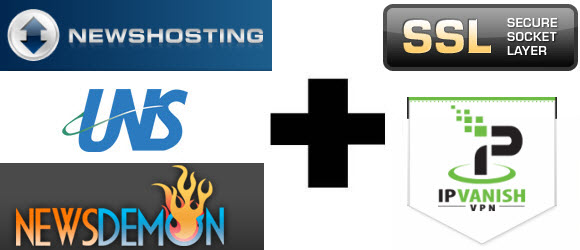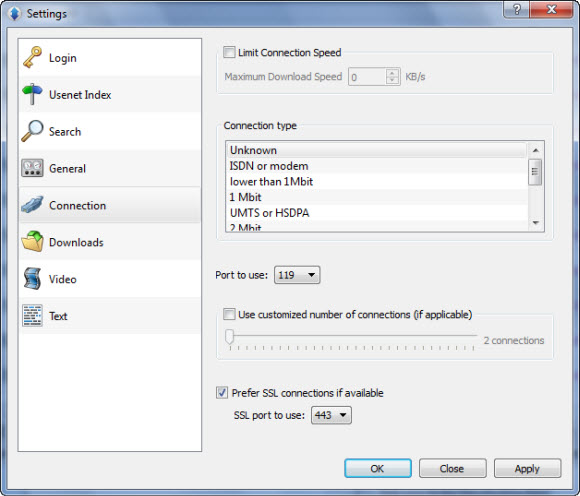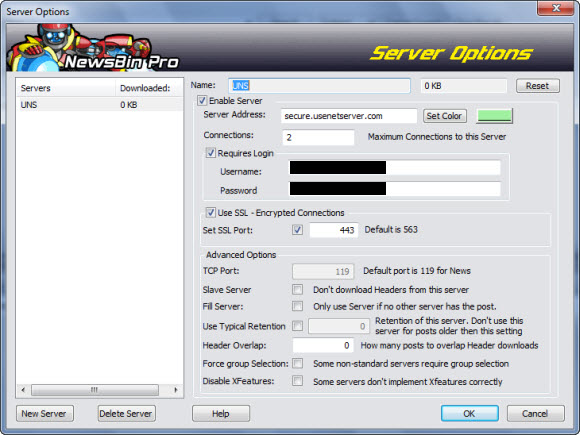Today we’d like to share some tips to help secure your privacy while accessing Usenet. Along with browsing the web and other applications. We get questions all the time from users who want to secure their connections. Most of them are familiar with the term SSL from secure online transactions. Yet they might not have experience configuring a newsreader for SSL. We will explain the process. Along with the advantages of personal VPN’s.

Let’s start by answering a couple of questions in regard to SSL.
- What is SSL and why would I want to use it?
SSL stands for Secure Socket Layer. We all use SSL for tasks like shopping online and accessing bank, credit card or other financial services. Why not take advantage of the same encryption to secure your Usenet connection.
- Why do I need secure Usenet access?
We won’t call it a ‘need’ but it is certainly our preference to secure our data online. Including user name and password. In addition SSL can help prevent the hassle of ISP bandwidth throttling and deep packet inspection.
Tip #1 – Find a Usenet Provider with SSL and Alternate Ports
In conjunction with SSL, alternate ports will help in securing your Usenet connection while minimizing the risk of poor performance from ISP throttling. Instead of using the port your ISP expects for secure Usenet traffic some providers offer alternate ports. While most Usenet services offer SSL encryption you have to look closer to see if alternate ports are available. We provide a table of alternate news server ports on NGR to help.
Here are a few leading Usenet providers that offer alternate ports:
Tip #2 – Configure Your Newsreader for SSL Usenet Access
Assuming you found a good Usenet provider with SSL access its time to configure your newsreader for secure access. We will demonstrate with a couple of examples. First with Newshosting using their new Usenet client. Then again with UseNetServer using Newsbin Pro.
- Configuring SSL with Newshosting and the new Newshosting Usenet client
If you haven’t had a chance to try the new Newshosting client they are currently offering a 14 day free trial. Once downloaded you simply launch the newsreader. Entering in your username and password credentials. Next click on Options – Settings and choose the Connection tab. Here is the resulting screen:

The process couldn’t be much easier. As you don’t even need the news server address to access via the Newshosting newsreader. You’ll notice an option at the bottom of the screen labeled ‘Prefer SSL connections if available‘. Simply check the box. Then choose your desired port. The default SSL port for Usenet is 563. For most this is fine but we highly recommend using port 443. As port 443 is the same port secure web traffic passes over. Not much chance your ISP will want to mess with traffic on port 443.
- Configuring SSL with UseNetServer and Newsbin Pro newsreader
This is more of the traditional process for those who have their own Usenet client. We use UseNetServer for this example since they rank #1 on NGR and offer $10 unlimited Usenet access. Along with our top rated newsreader – Newsbin Pro which offers a free trial download.
After opening Newsbin Pro click on Options – Servers. Choose the server you entered during setup or add a new service. Either way the news server address for SSL access to UNS is secure.usenetserver.com – enter it into the Server Address field as shown below.

Just under the Server Address box you’ll notice an option for ‘Use SSL – Encrypted Connections‘. Check the box and then enter a port number. Again the default SSL port for NNTP is 563. For best performance (to deter ISP traffic tampering) we suggest you use port 443.
Tip #3 – Consider a Personal VPN Service
Our final tip goes well beyond Usenet. As we believe that all your online activities should be private and secure. We’re not advocating bad behavior either. We just believe that what you do online is your business. If you choose to tell everyone about it on Facebook that’s one thing. However, if you want privacy then a VPN will help.
For full disclosure we’d like to point out that in addition to NGR we manage a VPN review site – vpnsp.com – where we’re working hard to build up a complete resource for those seeking VPN access. Nearly two years into the project we feel good about it’s progress and are happy to share VPNSP with our readers.
Personal VPN’s offer a number of advantages. Here’s are a few examples of how VPN access might help you:
- Secure Wi-Fi access – always protect yourself on open networks!
- Secure Internet access, email, Skype, VoIP, etc.
- Anonymous Internet access – protect your personal information from sites that profile visitors
- Help decrease the chance of your ISP throttling traffic
- Don’t allow others to track you by your IP address
- Enjoy familiar content while traveling – Netflix, Hulu. YouTube, Facebook, Pandora, etc.
Just like Usenet providers, personal VPN services are not all created equal. There are a number of factors to consider when comparing VPN providers. Before purchasing an account consider these features:
- Don’t overpay. Just like anything else the most expensive providers aren’t always the best. You can easily find quality VPN access for under $10 a month. With annual plans as low as $6 a month – VPN specials
- Does the service offer unlimited VPN? – as many Usenet fans will want unlimited usage.
- How large is the VPN provider’s network? How many countries does it span? How many total servers? How many total IP addresses?
- Total IP addresses is very important. While most smaller services don’t advertise the number, leading services like IPVanish, Hide My Ass, OverPlay andgladly share this information. Think of IP’s as the number of seats a VPN service has open. If those seats fill you can’t connect.
- Look for a service that supports OpenVPN, L2TP and PPTP protocols. OpenVPN will provide the best security while L2TP/IPSec and PPTP will extend compatibility to iOS and Android devices.
- If you want to secure your entire home network with one VPN account look for a service that supports DD-WRT routers.
Here are a few leading personal VPN services to consider:
We hope you’ve found our tips for helping secure your Usenet access with SSL and VPN useful. For more information on secure Usenet access visit Newsgroup Reviews. For those who would like to learn more about VPN visit our VPN Service Providers review site. Follow us on Twitter – @NewsgroupRevs and @VPNSP for the latest Usenet and VPN news along with special promotions.




